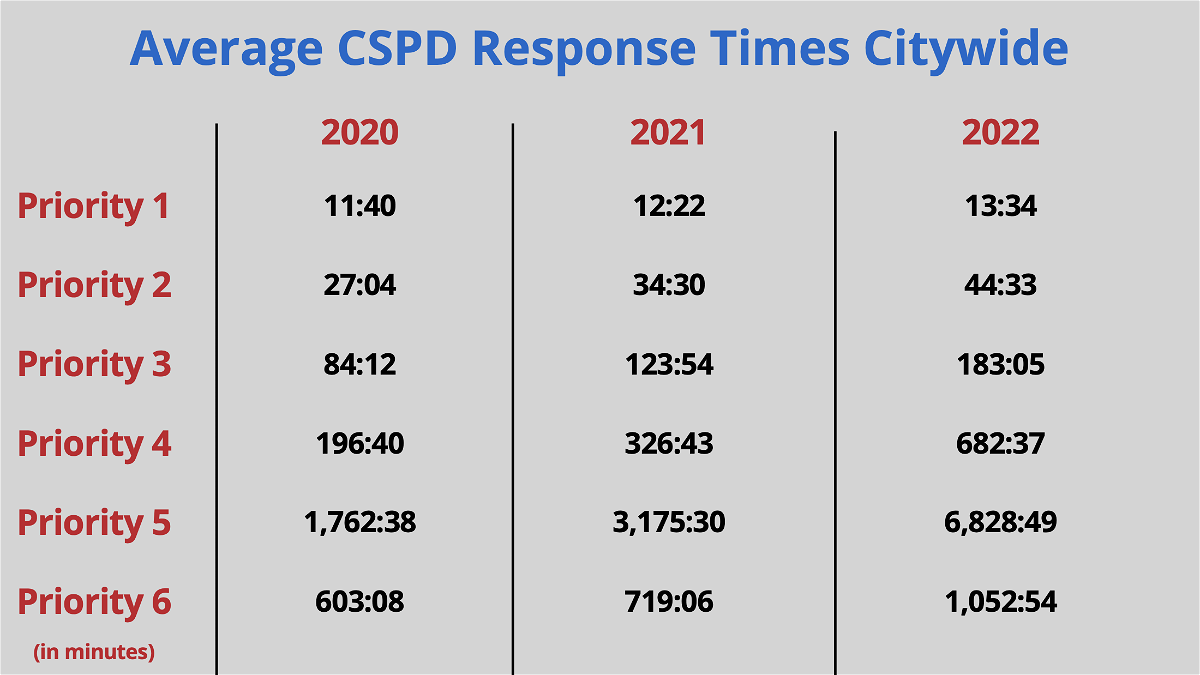CSPD response times increase for all priority calls in the last two years
Colorado Springs, Colo. (KRDO) -- When Nikki Elliot’s car was broken into earlier this month, it took the Colorado Springs Police Department five days to show up and take a report — an example of the department’s rising response times across the city.
Since 2020, CSPD’s response to Priority 1 and 2 calls, or those considered life-threatening and a danger to the public, increased by an average of two and 27 minutes, respectively. And as the severity of the calls decreases, the response times rise exponentially.
Compared to 2020, officers arrived about 100 minutes later for Priority 3 calls and eight hours later for Priority 4 calls.

“Unfortunately, the volume of calls and the types of calls that we have to handle that are time intensive have reduced our ability to handle those other calls on a regular basis,” said Robert Tornabene, the senior public communications supervisor for the Colorado Springs Police Department.
Tornabene said officers respond to calls in order of importance. Priority 1 and 2 calls are life-threatening or include danger to the public. Priority 3 and 4 calls, like car crashes, could include injuries but there is no immediate threat to the public. Priority 5 and 6 are the least important. They include no injuries and no threat, like property damage.
In 2022, it took an officer an average of five days to respond to Priority 5 calls.
Elliot’s car is one of the many Kias being broken into across the city after a viral TikTok video showed how to steal some of the company’s cars. One of the windows was shattered and the deconstructed steering wheel shows the suspect tried to hotwire the car.
Elliot said she called in the break-in and attempted theft on February 7 and continued to call every day until an officer responded on February 11.
Tornabene said the city’s increasing growth is placing more responsibilities on officers.
“We have more people here,” he said. “The traffic now has greatly increased. Residents are out and about, and as a result, we've run into this area where we have very intensive call responsibilities to handle.”
While police response times increased city-wide, data shows people in southwest Colorado Springs waited the longest for police during life-threatening emergencies — an average of 14 minutes. The area, considered the Gold Hill division, consistently had longer response times than other divisions for all categories of priority calls.
“Gold Hill handles the Downtown area as well, so the population down here during the daytime and in the evening is a little larger,” Tornabene said. “We're time intensive, so having that responsibility is going to increase their times.”
Despite the department’s rising response times, its officer staffing is at 93% capacity. The department currently has 754 officers, but 46 are academy recruits and are still in training. Right now, the department can fill 803 officer positions. But that number is supposed to rise in the coming years. Colorado Springs City Councilman Randy Helms said the council increased the department’s budget for 2023 to include 15 additional officers.
To help reach that capacity, the police department decided to switch to a continuous academy. Instead of a potential recruit waiting six to nine months to start in the academy, the department will begin classes when there are enough recruits.
“Once we get enough people to fit into an academy, classes will start up right away,” Tornabene said. “That will reduce our numbers over time. We're hoping that by doing that, as we add more bodies in, we're going to get to our allotted amount of staffing.”
The department is also asking residents to file online reports for lower priority calls to help free up officers to respond to more serious incidents.
“Obviously for some of those minor crimes, people just need it for an insurance report, just getting them to go to the filing online report so they can turn it over to their insurance company and they can recover their loss, that would be beneficial,” Tornabene said.
